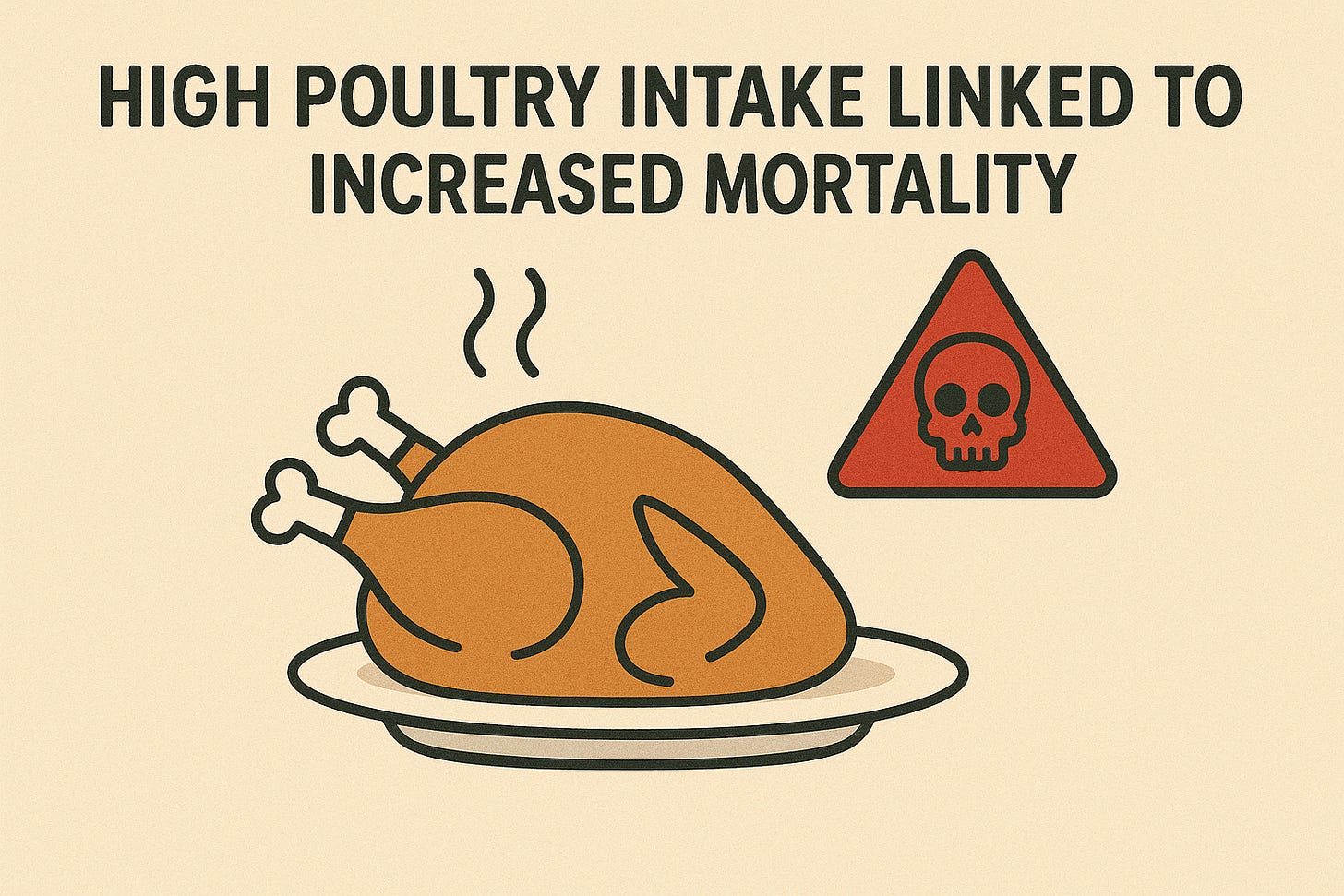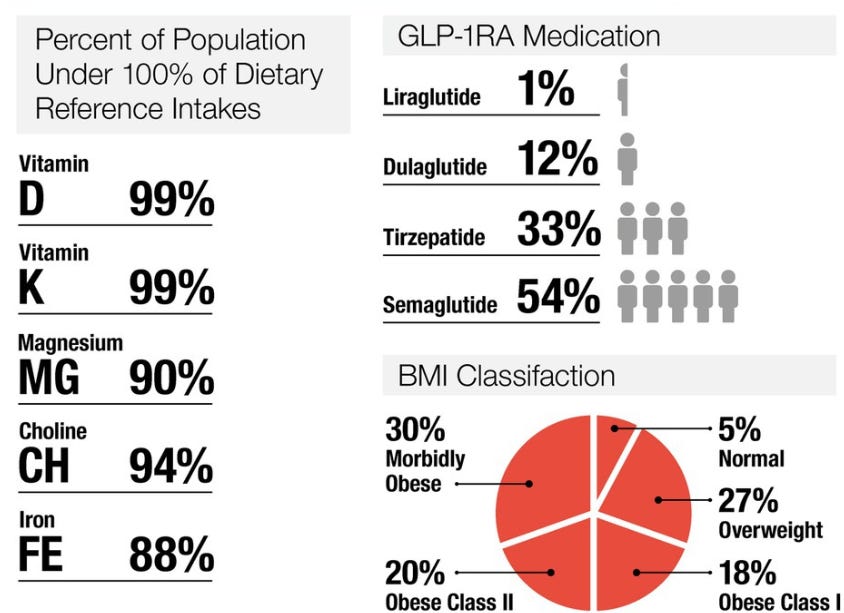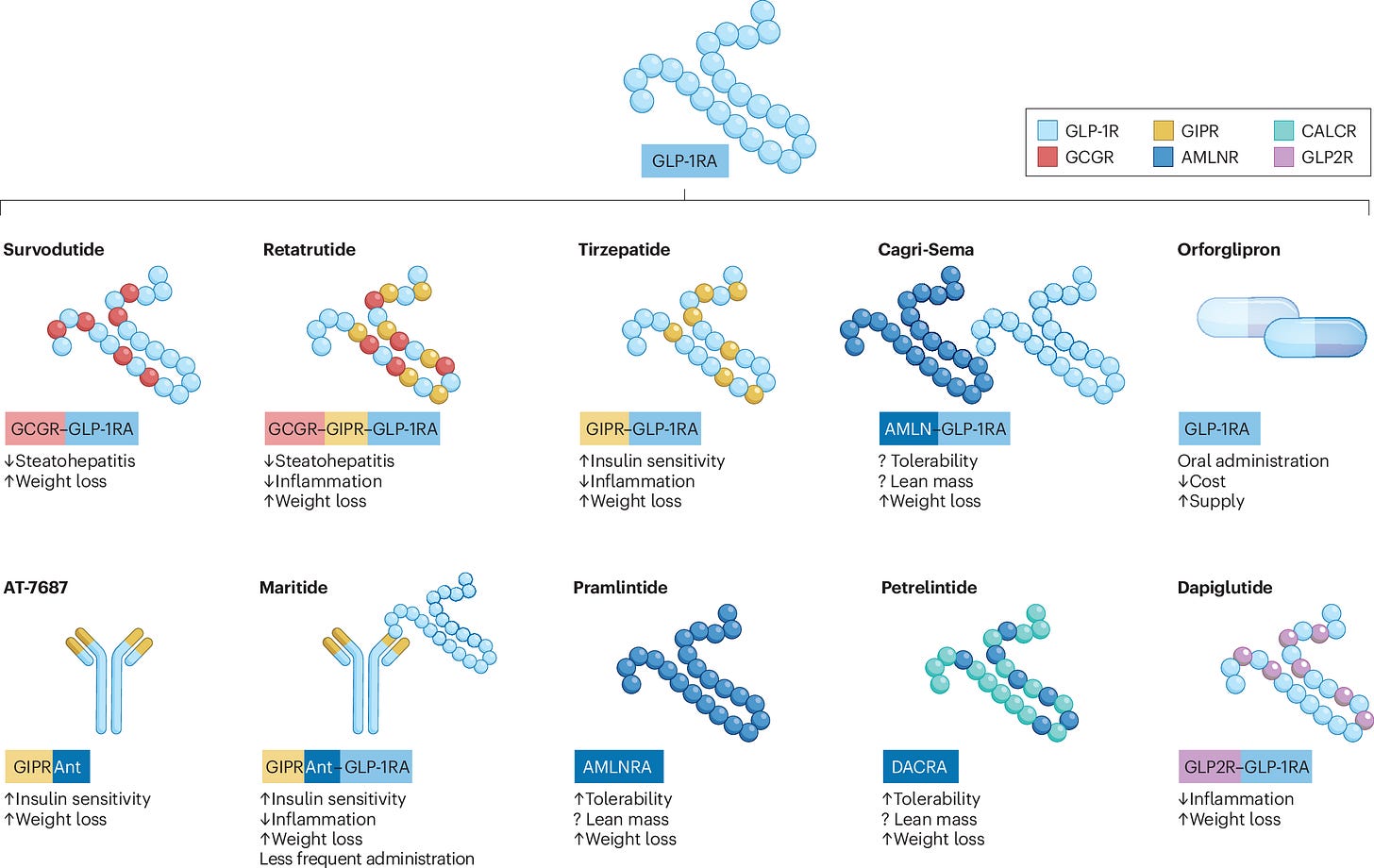The Gut Punch Weekly #18
Novo declares truce with telehealth cos, GLP-1 compounders keep losing in court, poultry intake linked to significantly higher early death risk, and more!
Top Stories
1) Novo Partners with Telehealth Companies for Affordable Wegovy Access
Novo Nordisk has partnered with telehealth providers Hims & Hers, Ro, and LifeMD to offer discounted access to its weight loss drug Wegovy, with prices ranging from $499 to $599 per month.
The partnerships integrate Novo's NovoCare Pharmacy into the telehealth platforms, allowing self-pay patients to access Wegovy at a significantly reduced cost compared to the $1,350 list price.
This move follows similar collaborations between Eli Lilly and telehealth companies, signaling the pharmaceutical industry's efforts to enhance the affordability and accessibility of GLP-1 medications.
2) Judge Blocks Compounded Versions of Ozempic, Wegovy
A U.S. judge rejected compounding pharmacies' request to continue producing copies of Novo Nordisk's Ozempic and Wegovy while a legal challenge over drug shortages is ongoing.
This decision upholds the FDA's May timeline for large U.S. compounders to exit the market for these drugs.
The ruling follows a similar decision earlier this year that prevented compounding pharmacies from making copies of Eli Lilly's weight-loss and diabetes drugs Zepbound and Mounjaro.
Novo Nordisk has filed 111 lawsuits across 32 states against entities unlawfully marketing and selling compounded semaglutide, demonstrating the company's aggressive stance on protecting its products.
(Reuters)
3) Lilly Sues Four Companies Over Unauthorized Tirzepatide Copies
Eli Lilly has filed lawsuits against four telehealth providers for allegedly promoting and selling compounded versions of tirzepatide, the company's top-selling weight-loss drug, after the FDA declared the shortage over and banned compounding.
The pharma giant accused these providers of engaging in the 'corporate practice of medicine,' making sweeping decisions that dictate patient care and putting financial interests ahead of patient well-being.
Lilly claims that some of these companies have switched patients' formulations and dosages en masse without medical justification, potentially putting patients at risk with untested combinations.
(Biospace)
4) High Poultry Intake Linked to Increased Mortality
A large multi-decade study found that consuming more than 300 grams of poultry per week is linked to a significantly higher risk of early death and gastrointestinal cancers, especially among men.
Mortality risk increased progressively with higher poultry intake, and cooking methods like grilling or barbecuing at high temperatures may further elevate cancer risk.
Researchers recommend moderating poultry consumption and switching to other lean protein sources that aren't strongly linked to gastrointestinal cancers.
(Fortune)
GLP-1 Industry Intel
Denmark Invests Ozempic Profits in AI Supercomputer Initiative: Denmark is investing Ozempic profits into AI infrastructure, including the $87 million Gefion supercomputer to avoid becoming overly dependent on Novo Nordisk like fellow Nordic nation Finland was on Nokia.
Competition May Slow Novo Nordisk's Wegovy Sales Growth: Novo Nordisk, whose market value has declined 45% since December, may lower its 2025 sales guidance for Wegovy, due to plateauing prescriptions and intensifying competition from Eli Lilly's Zepbound.
Humana Expands Specialty Pharmacy with Wegovy Home Delivery: Humana's CenterWell is partnering with Novo Nordisk to directly deliver Wegovy to cash-paying patients expanding access to GLP-1 drugs via telehealth and home delivery.
Ypsomed Exits Diabetes Care to Focus on GLP-1 Injectors: Ypsomed is selling its diabetes care business to TecMed for $512.9 million to focus on developing self-injectors for GLP-1 medications and other subcutaneous drugs.
Novo Nordisk's Wegovy Weight Loss Drug Debuts in Thailand: Novo Nordisk has launched its weight-loss drug Wegovy in Thailand, marking its debut in Southeast Asia amid the region's rising obesity rates and growing demand for obesity treatments.
Food & Wellness Industry Intel
PepsiCo Phases Out Artificial Colors, Responds to SNAP Changes: As PepsiCo phases out artificial colors from major brands like Lay's and Tostitos, the company is also addressing SNAP program changes and developing products for GLP-1 drug users who seek more protein, fiber, and hydration options.
Experts Advocate Plant-Based Diets for Ozempic Users: As GLP-1 medications like Ozempic suppress appetite and potentially lead to malnutrition, experts recommend focusing on nutrient-dense, plant-based foods to maintain proper nutrition while using these drugs.
GLP-1 Users Face Nutrient Deficiencies, Need Better Guidelines: A cross-sectional study of GLP-1RA users found participants consumed excessive calories, saturated fat, and sodium while falling short on protein and essential nutrients like calcium, iron, and vitamins.
Weight Loss Drugs Boost Demand for Healthier, Clean Label Foods: Bay State Milling's Ed Fish forecasts three major shifts due to GLP-1 drugs due to GLP-1 drugs: reduced calorie intake, preference for less processed foods, and broader awareness of diet-health connections.
Weight-Loss Drugs Lead to Snack Food Sales Drop: Studies show users of GLP-1 weight-loss drugs like Ozempic are significantly reducing their purchases of processed foods and shifting toward healthier options, prompting food manufacturers to consider reformulating products and adjusting portion sizes.
Khloé Kardashian Joins Protein Snack Trend with New Popcorn: Khloé Kardashian has launched a new protein popcorn brand, capitalizing on consumers' social-media-fueled growing appetite for protein-enriched foods that has sparked a wave of protein-enhanced snacks.
New Serum Reverses 'GLP Face' in Weight Loss Patients: A new serum significantly improves skin quality and reverses facial aging in GLP-1 drug users, showing visible benefits in elasticity, hydration, and wrinkles within six weeks.
Fibersol Supplement Boosts Satiety and GLP-1 Levels: Fibersol, a digestion-resistant soluble dietary fiber, can help with weight management by increasing GLP-1 and PYY hormones, reducing blood glucose, and supporting digestive health.
Nourish Raises $70M to Expand AI Nutrition Services: Virtual nutrition counseling startup Nourish, which offers insurance-covered dietitian services across all 50 states, has secured $70M in Series B funding to expand its AI capabilities and provider network.
Frontline Focus
Pharma Giants, Compounders Lobby Trump on Weight Drugs: Pharmaceutical giants and telehealth companies are heavily lobbying the Trump administration over weight-loss drug availability, Medicare coverage, and regulation of cheaper copycat versions.
Amateur Athletes Turn to Ozempic for Performance Gains: Amateur athletes are increasingly using Ozempic and similar weight-loss drugs to enhance performance, despite health concerns and scrutiny from sports authorities.
Compounded GLP-1 Options Vanish, Patients Face High Costs: The FDA's decision to end compounded GLP-1 drug production has left hundreds of thousands of patients struggling to afford brand-name weight loss medications that cost significantly more than their $200 monthly compounded alternatives; FDA's decision to end compounded GLP-1 drug production has driven up costs.
Man Blames Ozempic for Blindness, Files Lawsuit: A Maryland man is suing Novo Nordisk after allegedly becoming blind from taking Ozempic, claiming the company failed to warn about potential vision loss risks.
Social Disparities Limit Access to Obesity Medications: A new JAMA study reveals significant disparities in prescribing weight-loss drugs semaglutide and tirzepatide with lower rates among males, minorities, rural residents, and those in socially vulnerable areas.
Gen Z Fuels Ozempic Microdosing Trend for Weight Loss: According to healthcare software company Tebra's survey, nearly 9 in 10 Gen Z Ozempic users are microdosing their medication primarily to minimize side effects and reduce costs.
Ozempic Redefines Wedding Dress Fittings and Planning: The rise of GLP-1 medications is transforming wedding preparations, from major dress alterations to potential menu adaptations, as more couples use these drugs for pre-wedding weight loss.
Gen Z Prefers Natural Weight Loss Over Drugs: Despite soaring prescriptions and high awareness among youth, a nationwide survey finds Gen Z largely resistant to weight-loss drugs amid concerns about safety, media hype, and drug shortages.
GLP-1 Clinical Insights
GLP-1 Drugs Offer Broad Health Benefits Beyond Diabetes: GLP-1-based therapies are evolving beyond diabetes and obesity to offer promising treatments for cardiovascular, kidney, and other diseases, with next-generation drugs offering promising treatments for cardiovascular, kidney, and other diseases.
GLP-1 Drugs Gain Approval for Sleep Apnea Treatment: The FDA's approval of GLP-1 receptor agonist Zepbound for treating obstructive sleep apnea marks a groundbreaking shift from device-only treatments to medication-based approaches for the condition.
GIPR Antagonism Relies on GLP-1R for Weight Loss: A study demonstrates that while both GIPR agonism and antagonism can reduce body weight and food intake, they operate through different neural pathways, with antagonism specifically mimicking GLP-1R agonism in the dorsal vagal complex.
GLP-1 Drugs Reduce Recurrent Atrial Fibrillation Risk: A large VA study found that GLP-1 receptor agonists significantly reduced recurrent atrial fibrillation events in patients with type 2 diabetes and obesity after ablation.
Ascletis Favors Low-Dose Strategy for Oral GLP-1 Titration: Ascletis' phase 1b trial data shows their oral GLP-1 drug ASC30 achieves similar weight loss with lower, slower dose titration and demonstrates better gastrointestinal tolerability.
GLP-1 Weight Loss Drugs Linked to Mental Health Risks: New research suggests that popular weight-loss drugs like Ozempic and Wegovy could potentially trigger depression and suicidal thoughts in people genetically predisposed to low dopamine function.
The Bleeding Edge
Brain Automatically Counts Calories Before Eating Begins: Scientists have discovered that the brain's eating control systems operate largely automatically and unconsciously, with neurons calculating caloric density before, during, and after eating.
Brain Receptors Vital for Obesity Drug's Weight Loss Effect: Researchers found that a peptide-antibody conjugate which targets both GIPR and GLP-1R receptors in the brain achieves maximum weight loss in obese mice, opening up a promising new therapeutic strategy for obesity treatment.











